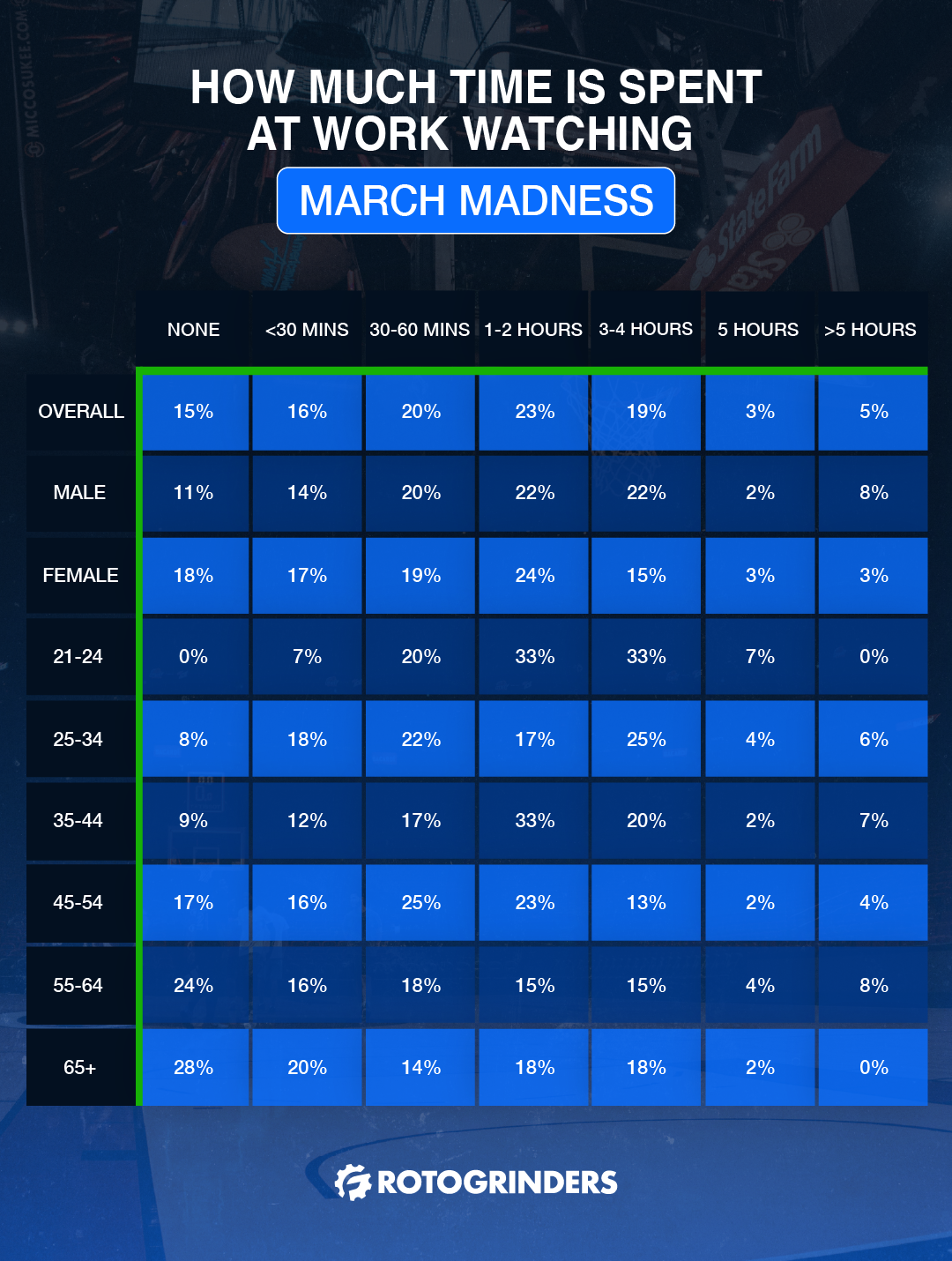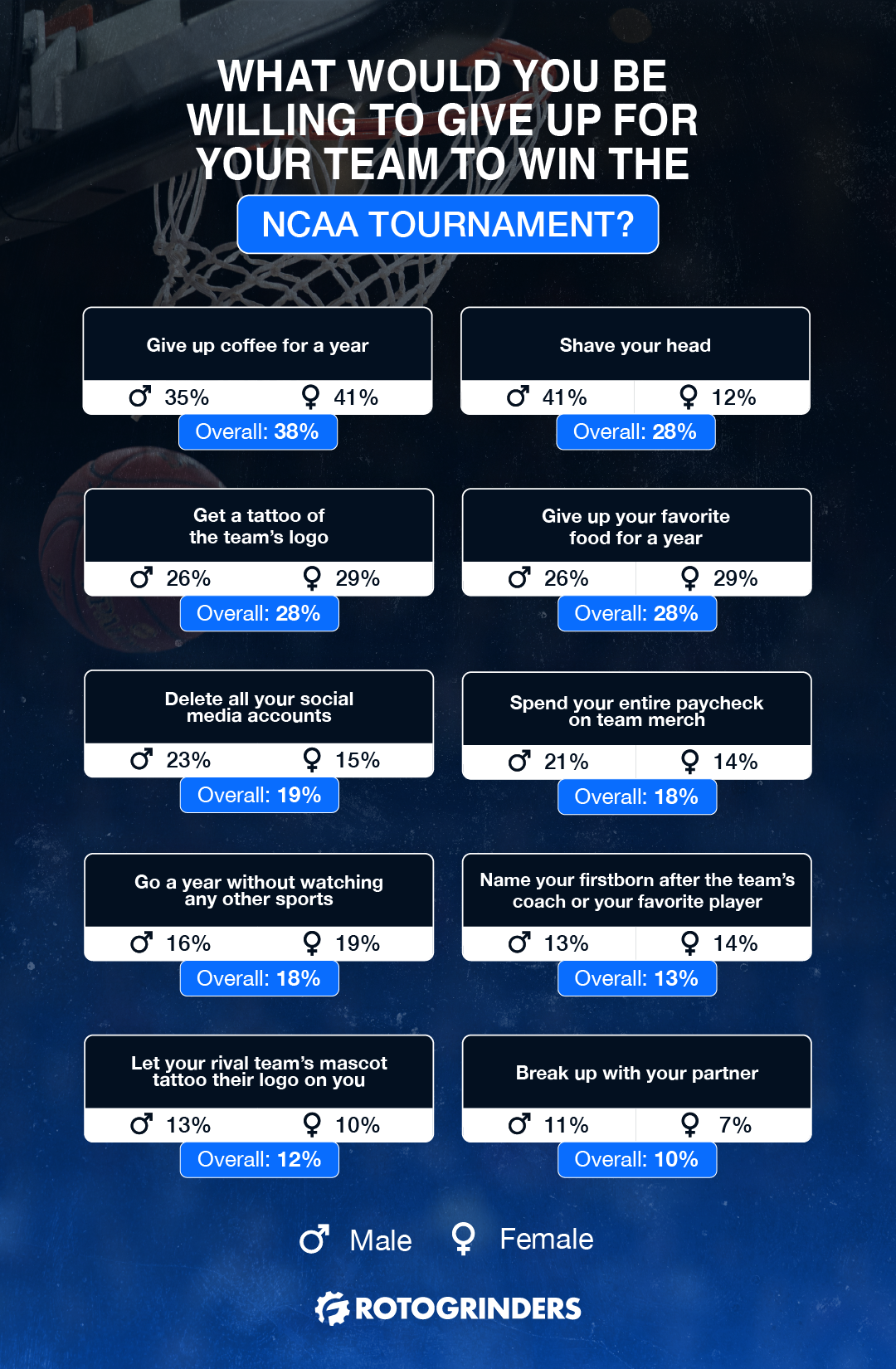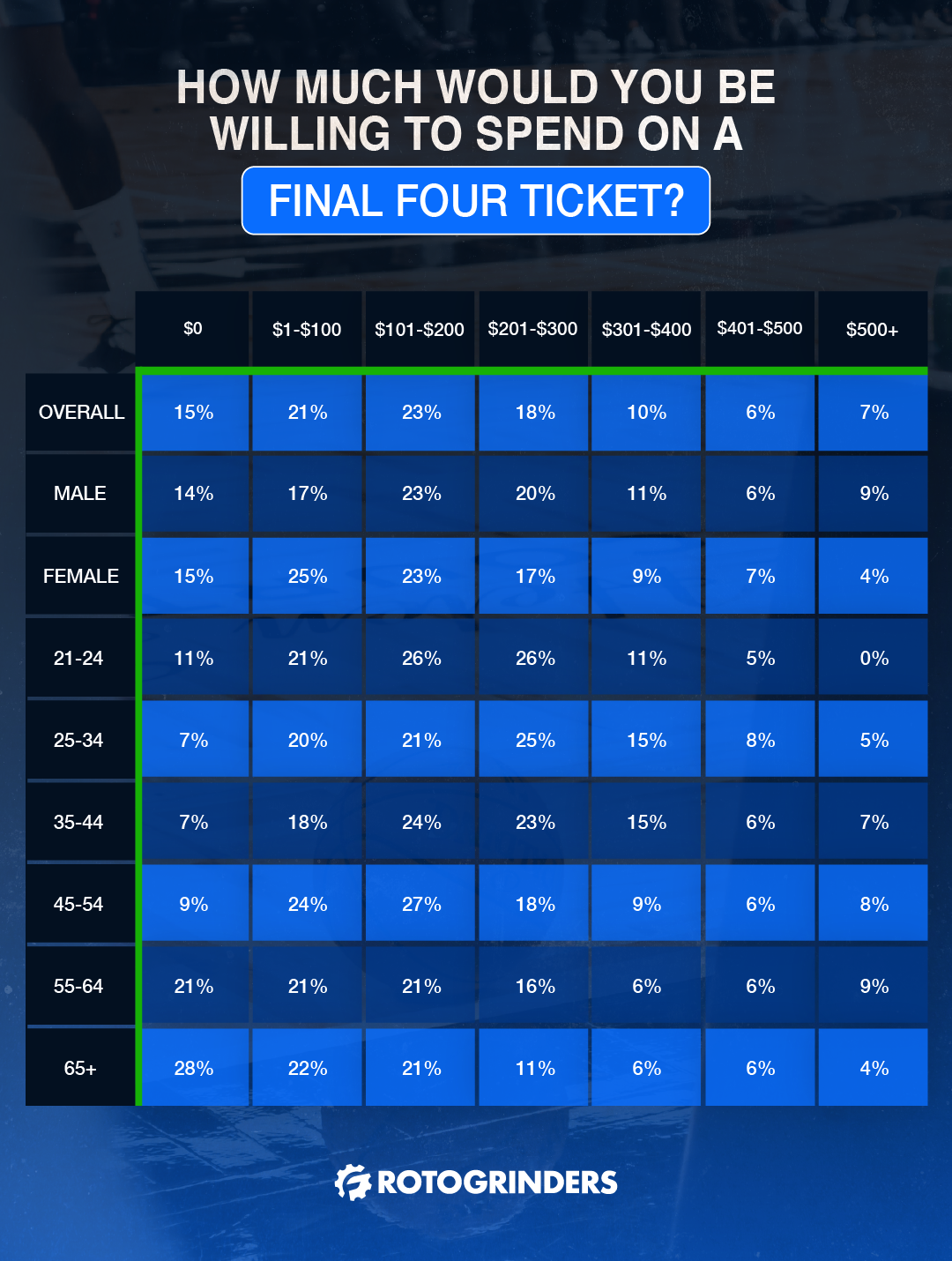How March Madness affects work productivity: a survey of 850 fans

It’s almost time for the 2025 March Madness tournament – the most exciting time of the year for NCAA basketball fans across America. The chaos of the single-elimination bracket is the perfect place for future stars of the NBA to make a name for themselves.
We all love getting swept up in the March Madness mania, keeping up with every big upset and hoping our favorite teams will reach the coveted Final Four. But with 67 games to watch over the course of the month, it’s hard to find the time to stay committed.
As a result, some of us have to desperately balance our basketball fandom with our work lives, but how much does one affect the other? We surveyed 850 college basketball fans and asked a series of questions about their March Madness viewing habits, focusing on how it affects their work lives. Curious to see how they answered? Read on for a full breakdown of how March Madness gets in the way of a typical American’s work week:
How many days will you take off to watch March Madness?
Our survey found that more than half of March Madness viewers (53%) plan to take at least one day off work to watch the tournament this year. Young people are the most likely to skip work in favor of watching basketball – in fact, 70% of 21 to 24-year-olds say they’d take time off to see a game. 25 to 34-year-olds planned to take the most time off, though, with 5% saying they’ll take a week or more away from work to watch games.
Meanwhile, men are more likely than women to take time off for March Madness, as 60% of males said they will skip work for the tournament compared to 46% of female participants.
Have you ever had a sick day or skipped school to watch March Madness?
We’ve all woken up feeling tempted to fake an illness and call in sick to work, but how many of us have actually gone through with it for March Madness – and how often?
Almost half of those we surveyed (44%) say they’ve previously faked being sick to their employers or school so that they can watch the tournament. 49% of men and 39% of women confess to having lied about their health for a basketball game.
Of all the age groups who took part, 25 to 34-year-olds are the most likely age group to have called in sick to catch their favorite team – a massive 70% admit it. 35 to 44-year-olds, however, follow closely behind, with 66% saying they’ve pretended to be ill to keep up with March Madness. In some cases, fans might not even have to pretend to feel sick if the latest CBB odds aren’t in their favor.
Does your place of work accommodate March Madness?
Depending on your job, it can be tough to keep up with March Madness at work. While some workplaces have TVs in the office or will allow for time off to watch a game, 55% of Americans say their work doesn’t accommodate for watching the tournament during company hours.
As is probably expected, younger people are more likely to be in a place of work that allows them to watch college basketball, with respondents under the age of 45 being much more likely to catch a game while on the job.
How much time do you spend watching games while working during March Madness?

While less than half of Americans say their workplace accommodates for watching March Madness during work hours, 50% of our respondents say they watch at least an hour of the tournament at their job per week. Just make sure your boss doesn’t see what’s on your computer screen!
The average male American spends about 2 hours of their work week keeping up with March Madness, while women average around 1.42 hours in the same time frame. 21 to 24-year-olds spend the most time watching the tournament weekly, with a typical young person spending 2.17 hours a week watching games as they work.
What would you be willing to do for your team to win March Madness?

Some basketball superfans would go to extreme lengths to make sure their favorite school brings an NCAA title home, so where does the typical American draw the line for showing their support?
When we asked our survey participants what they’re willing to do to ensure their favorite team makes it all the way through the March Madness bracket and wins the tournament, giving up coffee for a year was the most common answer, with 38% of respondents saying they’d trade caffeine for their college’s success.
The joint-second most common trades are shaving your head, getting the team’s logo tattooed, and giving up your favorite food for a year – with 28% of fans we surveyed saying they’d do any of them. Meanwhile, 19% say they’d delete all their social media accounts to guarantee their team a trophy.
How much would you pay for a Final Four ticket?

Everyone dreams of their favorite college basketball team making it to the prestigious Final Four of the March Madness tournament, placing them among the best teams in the country. And with such high stakes, fans are willing to pay huge amounts to see one of the games live.
64% of fans we surveyed say they’d spend more than $100 on securing a Final Four ticket, while 7% went as far as saying they’d pay more than $500 to be in attendance. 35 to 44-year-olds are willing to spend the most on average, with a typical fan in this age group saying they’d spend $231.55 for a ticket to the Final Four. People over 65 are the least willing to spend on tickets but would still put an average of $152.07 towards getting a seat for one of the last March Madness games.
Incidentally, men are more likely to be up for buying expensive Final Four tickets, with the average male respondent willing to spend $231.55 for one. The average female college basketball fan draws the line at $152.07 for a ticket. Curiously, 15% of fans overall say they wouldn’t spend a single dollar on tickets for the Final Four – perhaps their spending more on their NCAA basketball bets?
How far would you travel for a Final Four game?
It’s easy enough to say you’d spend money on expensive tickets if you live near the venue for a Final Four game, but how far is a typical March Madness fan willing to travel to see their favorite team in a big-time matchup?
78% of fans say they are willing to travel to see a game, with just over half (51%) saying they’d be up to travel over 100 miles for a game. However, only 13% of fans are willing to travel more than 400 miles.
35–44-year-olds would travel the furthest, saying they’d be willing to attend a Final Four game a mega 177.78 miles away, on average.
How much do you typically wager on March Madness?
With so many potential upsets, and a huge pool of games to choose from, March Madness is a great time for sports betters to make bets on their favorite teams. 73% of those we surveyed say they bet on the tournament, with $5-$20 being the most common amount of money put on the line. 17% of fans bet more than $50 on the tournament when watching.
The average wager that our surveyed fans put on March Madness totals around $23.49, with women tending to favor smaller bets when compared to men.
Do you reckon you know which players will take their team to the finals this year? Or maybe you have a hunch about a major upset? You can keep up to date with all the latest NCAA picks and fantasy college basketball news with RotoGrinders, so you can be one step ahead of your friends when placing your bets! Keep an eye on our site for all the biggest updates across the March Madness tournament.
Methodology
Using 3Gem, RotoGrinders conducted a survey of 850 American March Madness fans in March 2025, nationally representative, aged 21+.